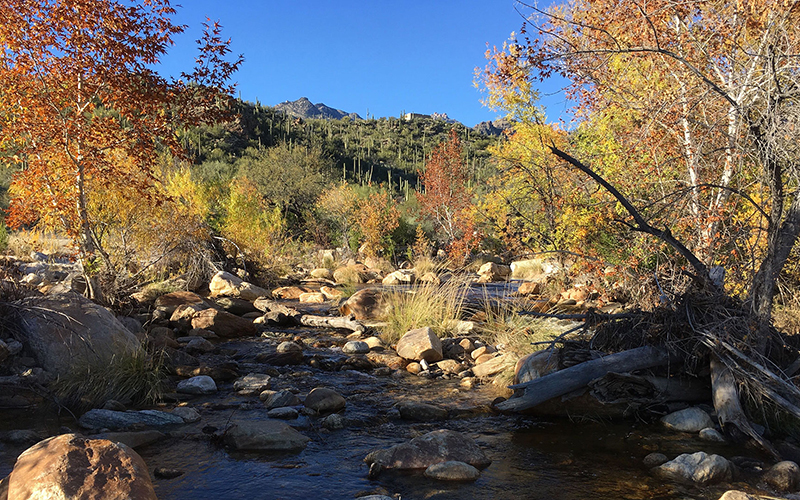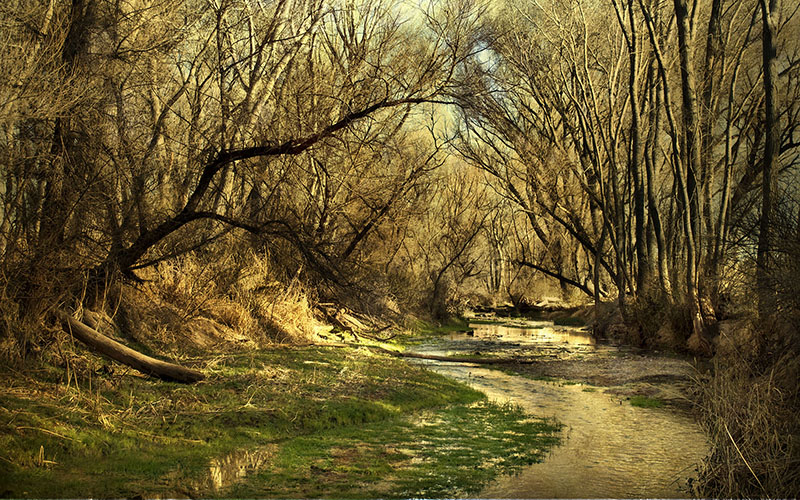
The waters of Sabino Creek in Tucson flow intermittently. It’s currently on the state’s draft list of protected surface waters. (Photo by Ariana Brocious/Arizona Public Media)
Since June, a large proportion of Arizona’s rivers, lakes and streams have not been protected by the Clean Water Act, the result of changes to federal rules by the Trump administration in 2019. The state had relied on the landmark law to keep its arid streams free of pollution.
But after the federal protections were limited, Arizona set to work on its own set of surface-water quality standards.
For the past two years, the Arizona Department of Environmental Quality has been working to craft the new rules with public input. Trevor Baggiore, director of the agency’s water quality division, said a bill currently moving through the Legislature will help fill the regulatory gap.
“This legislation provides immediate protection for Arizona’s wet waters. These are waters that we drink, waters that we fish in and waters where we recreate,” Baggiore said.
The new program would create a list of protected surface waters determined by the state and a panel of farmers, city leaders, industry groups and environmentalists. That list could be modified in the years to come through ADEQ’s rulemaking process.
But a group of 16 environmental groups say the bill is lacking. They say one gaping hole is that ephemeral waters — those that flow only after rain or snow — will not be protected. Kris Randall, president of the Arizona Riparian Council, said that ignores Arizona’s specific climate and environmental realities.
“We have areas that only flow when there’s a precipitation event,” she said. “That is the way it is in our desert ecosystems and it’s not taking in the science of how our hydrology in Arizona works.”
Randall and others said the protections in the bill are too narrow and don’t address the consequences of leaving ephemeral waters unprotected from pollutants. That’s the same criticism lobbed at the Trump administration for its rollback of the Clean Water Act.
“When (water) does flow, it’s flowing downhill,” Randall said. “So it would be impacting those rivers that are continuously flowing, from discharges from ephemeral or intermittent streams. It’s concerning. If you’re not dealing with it, at what point do you deal with it? When it becomes a problem? That’s a little too late.”
Randall, who spent 11 years working as a state water quality regulator, said if the bill passes in its current form, it’s unlikely ADEQ would have incentive to expand protections in the future.
“There’s no motivation for them at that point,” she said.
Environmental critics also point out that the bill fails to consider the impacts of climate change, and say a permitting program, rather than a best management practices approach, should be taken for dredge and fill operations on state protected waters.
Baggiore said the state sought to create an Arizona-specific set of regulations to protect wet waters immediately. He said they gathered input from a wide range of stakeholders in creating the regulations.
“Some people believe that more should be regulated,” he said. “Some people believe that less should be regulated. Our interest is ensuring that the waters that are out there today that are unprotected, that people are enjoying and engaging in, are protected. Ultimately, that decision on ephemeral washes is a policy call that our elected officials need to make.”
The Arizona Farm Bureau Federation, along with the mining industry and developers, is in favor of the bill. In 2015, the Obama administration expanded the definition of waters protected under the Clean Water Act. That made farmers and ranchers nervous about being accused of polluting streams and rivers, said Stefanie Smallhouse, Arizona Farm Bureau Federation.
“It was very hard to understand whether you were going to need a permit or not,” Smallhouse said. “It was difficult to understand whether the exemptions for agriculture applied 100% of the time or only certain times.”
Many farmers criticized the Obama-era rule change as a federal overreach.
Smallhouse said the Arizona Farm Bureau supports the changes made by the Trump administration, which dramatically reduced the waters that fall under federal protection, because it provided more clarity and put the onus for protection on states. They support the state’s proposed regulations, which she said has clear exemptions for agriculture.
“So we feel like it’s protecting clean water. It’s protecting our waterways. It’s protecting areas where there’s actually water and the rules are clear,” Smallhouse said.
Still, others say this legislation isn’t ready to become law yet. Just before the bill passed Wednesday in the Arizona House on a narrow vote, Rep. Aaron Lieberman, D-Paradise Valley, urged his colleagues to vote against it.
“I just want to share that the city of Phoenix, which provides water to an enormous number of Arizonans, is opposed to this bill as currently constructed,” he said. “There’s a lot of challenges, a lot of concerns with this, and I think we need to go on a lot slower pace with this.”
Several lawsuits have been filed against the Trump rule change, which leaves the question about what will happen to the state regulations if the courts or the Biden administration overturn Trump’s changes. Baggiore said the Department of Environmental Quality is watching those closely but said changes aren’t likely to happen quickly.
“So this program is still ultimately required to make sure there’s a baseline in Arizona so we understand what waters in Arizona are regulated and which ones are not,” Baggiore said.
He said if federal law expands protections again, those would still take precedent over state rules.
This story is part of ongoing coverage of the Colorado River Basin, produced by Arizona Public Media, distributed by KUNC, and supported by the Walton Family Foundation.
